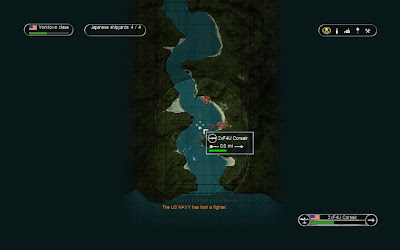
Battlestations: Pacific is a bit of a conundrum. On the one hand, the game has an interesting take on both the usual generic limitations of WWII as well as a unique approach to fairly limited offerings of available console strategy games. You can decal the nose of your favorite fighter with swell period pin-up girls for use in online dogfights. Taking command of a massively powerful battleship like the South Dakota class (armed with a full battery of 16” guns) feels undeniably bad ass.
On the other hand, the grainy, real-life film footage shown before each mission begins is, sadly, a little misleading. Pacific’s tactical-yet-arcadey combat may reach the tracer-saturated fever pitch depicted on the back of the box from time to time, but seemingly just as often the chaos of the Pacific theater’s large-scale naval, air and infantry battles (the last of which isn’t playable here) seem strangely muted.

The game throws numerous scenarios at you in which you control, say, one or two cruisers or a destroyers, but rarely allows you access to the entire naval armada, instead seeing fit to dole out command of ships one to three at a time (and even then only as replacements for any vessels you may have lost). Carriers, which act as RTS-style bases, can produce fighter planes to help you maintain the offensive or defensive upper hand, but only allot one four-plane squadron each. The result is a campaign of island hopping support that, while enjoyably strategic, isn’t necessarily spread evenly and can feel somewhat sparse at times.
What’s baffling about Pacific is that despite a serious graphical overhaul and boost in available units, in some ways it’s a step backward from its predecessor, Battlestations: Midway. Covering the earlier part of the war in the pacific (including the battles of the Solomon Islands—where there’s some over lap with Pacific—and, clearly, Midway itself) Midway used a full blown narrative and the ability to choose which tactical maneuvers to utilize in order to crush the Japanese resistance.

Aside from offering virtually no story aside from a spotty approximation of historical events (brought to tepid life by a cast of either bored or far too overzealous voice actors) Pacific has a penchant for tactically shoehorning you into using certain air or seacraft to accomplish various tasks (though it should be noted that additional units can be unlocked as you progress). The trade-off is that Pacific has a little over twice as much gameplay as Midway, complete with a full, alternate history Japanese campaign; beating both campaigns and unlocking everything will be more than enough to keep some of you coming back to this one.
Thankfully, despite a bit less tactical wiggle-room, Pacific’s arcade combat is still fun. Though controls and tutorials for the game’s dual sea and air fleets may seem a little daunting at first (the game even uses the two letter call signs actually used during the war to identify different types of air and sea craft), they’re streamlined so that even novice tacticians can enjoy the game. Letting off a volley of AA or dual-purpose guns is as easy as firing a gun in an FPS, and the intuitive targeting and formation systems can make even the most overwhelming battles manageable. Although you technically control units one a time, the game (mostly) lets you simultaneously carry out naval and air-based actions, issuing different commands while you control your preferred unit. This gives Pacific gives the overall feeling of a more hands-on RTS, which is pretty swell indeed.

Pacific also has its fair share of moments that are a tremendous rush. Laying waste to an entire fleet of Japanese warships in minutes with a bombardment of long-range guns (not to mention actually watching the explosion of twisted metal from a damaged hull or magazine) never gets old, and dodging through an intense hail of AA fire to successfully deliver a torpedo or bomb payload is exhilarating. In short, these are the moments that will make you want to keep playing. The sheer number of different units is a great touch too, although in order to really use them effectively you’ll likely have to take some prep time to familiarize yourself with the catalog.
At the end of the day, Pacific earns its wings as a more than competent strategy-action hybrid. There are times when it may feel a little too straightforward and, let’s be honest, the story and presentation generally come off as worse than a History channel re-enactment. Despite some setbacks, if Eidos Hungary can learn from their mistakes I have faith they can really put out the complete package with their next Battlestations effort. Give it a shot if you’re in the mood for a different kind of war game. At the very least, it beats the hell out of yet another tired period shooter.
Battlestations: Pacific
Eidos
Xbox 360
$59.99
3.5 out 5 stars

1 comment:
Well done, Mr. Haske. I'm still not convinced I wouldn't get frustrated or bored and just hurl the controller across the room, but hey, that's why I play FPS and action RPGs. Clearly.
Post a Comment